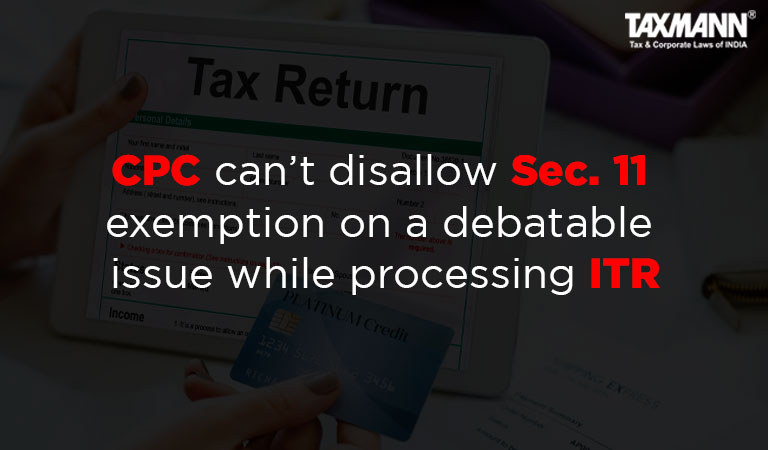CPC can’t disallow Sec. 11 exemption on a debatable issue while processing ITR
- Blog|News|Income Tax|
- 2 Min Read
- By Taxmann
- |
- Last Updated on 10 November, 2022

Case Details: Rajiv Gandhi University of Health Sciences v. DCIT - [2022] 144 taxmann.com 101 (Bangalore-Trib.)
Judiciary and Counsel Details
-
- Smt. Beena Pillai, Judicial Member & Chandra Poojari, Accountant Member
- Mrs Suman Lunkar, CA for the Appellant.
- S. Praveena, CIT DR for the Respondent.
Facts of the Case
Assessee was a trust registered under section 12A engaged in providing instructions, training, and research advancement in the sector of medicine and allied sciences. It filed the return of income claiming exemption under section 11 and declaring nil income.
The return of income of the assessee was processed by CPC and intimation under section 143(1) was issued denying the exemption claimed under section 11. The assessee filed a rectification application which was not entertained by the Assessing Officer (AO).
The assessee contended that no disallowance can be made on a debatable issue in an intimation issued under section 143(1). Whereas, the revenue contends that all kinds of adjustments can be made in an intimation under section 143(1).
The CIT(A) also upheld the disallowance made by CPC. Aggrieved-assessee filed the instant appeal before the Tribunal.
ITAT Held
The Tribunal held that the scope of permissible adjustments under section 143(1) is much narrower. It mandates that “no adjustments” can be made other than the items prescribed therein.
Further, in case of a claim which requires further inquiry, it cannot be disallowed without giving an opportunity of being heard to submit the proof in support of the claim. Therefore, debatable issues cannot be adjusted by way of issuing intimation under section 143(1).
Since no opportunity of being heard was provided to the assessee to present any evidence makes the case debatable, the department was not right in disallowing the claim unilaterally.
Disclaimer: The content/information published on the website is only for general information of the user and shall not be construed as legal advice. While the Taxmann has exercised reasonable efforts to ensure the veracity of information/content published, Taxmann shall be under no liability in any manner whatsoever for incorrect information, if any.

Taxmann Publications has a dedicated in-house Research & Editorial Team. This team consists of a team of Chartered Accountants, Company Secretaries, and Lawyers. This team works under the guidance and supervision of editor-in-chief Mr Rakesh Bhargava.
The Research and Editorial Team is responsible for developing reliable and accurate content for the readers. The team follows the six-sigma approach to achieve the benchmark of zero error in its publications and research platforms. The team ensures that the following publication guidelines are thoroughly followed while developing the content:
- The statutory material is obtained only from the authorized and reliable sources
- All the latest developments in the judicial and legislative fields are covered
- Prepare the analytical write-ups on current, controversial, and important issues to help the readers to understand the concept and its implications
- Every content published by Taxmann is complete, accurate and lucid
- All evidence-based statements are supported with proper reference to Section, Circular No., Notification No. or citations
- The golden rules of grammar, style and consistency are thoroughly followed
- Font and size that’s easy to read and remain consistent across all imprint and digital publications are applied



 CA | CS | CMA
CA | CS | CMA
